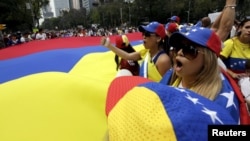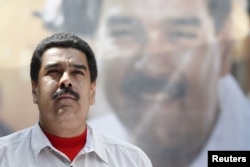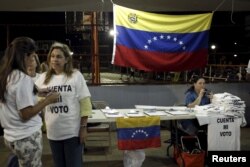Driven out by a depressed economy and uncontrolled crime, Venezuelan expatriates who for years have craved a defeat for the ruling Socialists hope it will finally materialize in legislative elections on Sunday.
While some ardent foes of President Nicolas Maduro are flying in to cast their ballots, most of the overwhelmingly anti-government expatriates will be biting their nails in Colombia, Panama, Spain and Miami during the National Assembly vote they cannot participate in from abroad.
"I'm frustrated that I can't vote because I really want this government out before it further destroys the country," said saleswoman Maria Laura Arena, 22, who moved to neighboring Colombia in September because she was tired of being robbed.
Fewer professional opportunities compounded by a deep recession and shortages of products ranging from condoms to chicken has pushed many in the middle and upper class to pack up and leave.
Rampant violent crime is also a trigger, especially for families with children.
Anger over those same problems is forecast to propel the opposition to a legislative majority in Sunday's vote, which would given them a strong platform to challenge the broadly unpopular Maduro.
Official data on Venezuelans who have left is difficult to come by. Sociologist Tomas Paez estimates some 1.5 million have emigrated since late leader Hugo Chavez took office in 1999 and that the pace has picked up under Maduro, though government supporters dispute those figures as overblown.
Nicknamed 'Saudi Venezuela' in the booming 1970s and once a magnet for European migrants, the OPEC nation is now brimming with goodbye parties and lines for passports or visas outside embassies in capital Caracas.
Officials often ridicule Venezuelans abroad as histrionic elitists made of the same mold as the traditionally right-wing Cuban exiles in Florida.
Other Venezuelans fret the brain drain will stymie the crisis-hit country's eventual recovery - in addition to hurting chances of voting out Maduro.
"The way out for the country is not Maiquetia," says Jesus Torrealba, the leader of the opposition Democratic Unity coalition, referring to the international airport outside Caracas.
Expat Prayers
Expatriates mobilized en masse in past presidential elections, in which Venezuelans abroad are allowed vote, even traveling by bus from Miami to New Orleans to cast ballots against the ruling movement known as "Chavismo," named after the charismatic former leader who died in 2013.
Their champagne, though, has stayed on ice, after bitter setbacks time-and-time again.
Their absence will be felt in Sunday's vote, where the size of a forecast opposition majority will determine its ability to maneuver against Maduro.
Determined to finally chip away at Socialist rule they say has wrecked the country, some Maduro foes are flying back into Maiquetia airport to vote.
"I came because the severe crisis deserves all our efforts," said Jesus, 44, who now runs a cheese-making business in Chile. "We can't let slip the few opportunities we have. Voting is the only way to protest without being persecuted."
But with flights pricey due to a currency dispute that has seen airlines slash service to Venezuela, a trip is out of the question for many.
For those abroad on Sunday, the opposition has created the web site 'Don't Let Anyone Vote For You,' where Venezuelans can declare themselves as unable to vote and so avoid potential fraud.
"I don't want any badly intentioned person to usurp my identity and vote," said Panama-based manicurist Lilimary Fernandez, 27, one of around 500,000 Venezuelans registered on the site.
For Angela Meneses, 62, a real estate consultant in Panama since September, it was anxiety over crime and political unrest that convinced her to stay put.
"To go there is to expose myself," she said. "So what will I do on Sunday? Pray. There's no other option."







